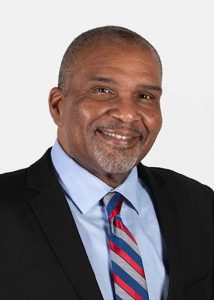-
Profile in Poise and Grace: Dr. Kevin Jordan

When one thinks of those in leadership positions, especially those in elected positions, is one quick to assume good things? Well, with the nature of our politics, especially today, most may not be quick to use positive adjectives. As described by those who know and work closely with Dr. Kevin Jordan, he is a true leader at Farmingdale State College (FSC) and he can unequivocally be regarded as compassionate, charismatic, and calm. Now, one might ask, what does Kevin Jordan do at Farmingdale? Who is he? Dr. Jordan, the son of Jamaica, Queens, “one of the best boroughs in New York City,” is the Vice President of Diversity, Equity, and Inclusive Excellence and Chief Diversity Officer, which is a critical aspect of daily function at FSC and important to the very fabric of the campus.
“I got a Doctor of Education Degree (EdD), because that is a hands on (the degree), being able to take theory and apply it to a practical situation is the route I decided to take,” Dr. Jordan stated. A professional career in higher education has been a calling for Dr. Jordan, a call to service. He has been at FSC since 2016, his responsibilities may have changed throughout the years, but he has remained true to himself and the Farmingdale community. It is important to know what Dr. Jordan does at campus and the importance of Diversity, Equity, and Inclusion (DEI) in higher education. With the national dialogue regarding DEI initiatives turning tense, and meanings being distorted, Dr. Jordan confidently and calmly reaffirmed the importance of DEI, likening it to other important movements throughout history. Simply put, “there has to be advocacy on a large level…” and if one takes the time to look at any change in history, it took advocacy, the coming together of different groups, unity to ensure that this country, “is true to its creed, to a more perfect union.”
When asked about being known as poised, graceful, compassionate, and calm, Dr. Jordan took that with great humility, “I feel very honored because those words have been attached to my character.” He went on to elaborate on those words, especially grace, something he tries to exhibit, as they are qualities that every human being ought to have. In our lives, many different hats will be worn, different roles to be fulfilled, but through it all, our humanity must remain strong. Additionally, Dr. Jordan is a religious man, a member of the clergy in his local community, and the grace he exhibits is driven through his fundamental belief in God. In his lived experiences, there have been times he has dealt with those who are not poised. In principle, when handling tough situations, one filled with a lot of friction; with that there is heat. This word of advice, that being, “staying calm and true to yourself and in turn others,” is an important approach in handling tough circumstances. Dr. Jordan quoting the Proverbial there always, “has to be an adult in the room,” to maintain a sense of direction and peace.
The clergy, religion, and faith are important to many folks, especially Dr. Jordan. He was very happy to talk more about his time as a cleric and provide his experiences, which span over 40 years. “I come from a history of ministers,” those being his father and uncles on his paternal side of the family. His belief in God keeps him focused, compassionate, and affords him the opportunity to, as much as he can, hear not only the vocal cries of humanity, but silent ones as well. In handling tough and difficult situations, “it is important to be a good listener, in my experience, things are not settled because people do not have the ability to listen.” He stressed bringing all folks together, that metaphorical (or literal) table to resolve an issue at hand. Asking questions, the more these are asked, and folks share their answers, then common ground can be established. Common ground is what builds the foundation of solution and addressing the difficulty at hands, establishing commonality is critical. Even if common ground seems so out of range, and impossible to establish, there will always be one thing everyone shares: humanity. This is something that most will experience in their lives, conflict, and the need to resolve said conflict; the thoughts Dr. Jordan provided can be applied in everyone’s lives. Throughout all of this, Dr. Jordan was very serene and undisturbed by the questions asked, eager to answer every question fully and intellectually.
“Hate consumes that energy called lifeforce,” and not only does it eat away at that life force, “it’s a malignancy.” Hate, this is something that every human does experience. We are sure to have found something that we “hate,” but “hate is a very strong word.” Not only is it a word, but this is something that consumes so much energy within a person, thus furthering the idea of hate rotting away and consuming lifeforce. Dr. Jordan made clear, with a profound voice, “if you are not careful, you will be hating everything.” One can discern the deleterious nature of hatred and after a while one who hates will end up with “great hurt,” done unto themselves, all said with a strong smile. At the end of the day, one cannot hate someone else without destroying themselves.
The conversation on hatred turned to commentary on the nature of politics and how those seeking power traffic hatred to win. How could a candidate feel comfortable to act and do in the hateful way that they market it, that being hatred? Dr. Jordan simply replied, “hate is often accompanied by a person’s fear and insecurity, then when you mix that with a human quality, that being the lust for power, consumes American politics and is beyond dangerous.” When it comes to hate and tying it to his work in the clergy, Dr. Jordan had this to say, “I meet you three times. When you are hatched, matched, and dispatched. I have never been around a baby, a youngster, who is just filled with hatred,” Dr. Jordan is firm in his belief, as are many others, that one is not born hating others, but taught to do so. The conversation turned personal as he reflected on a situation that had unfolded a few weeks ago. He likes to remain active, especially going for regular walks on his route, around the neighborhood in which he lives. “I’m walking my normal route around the neighborhood and there were two young boys, both of whom were white, and they were laughing, making jokes, when they turned the corner and saw me… they stopped cold, they froze, looking at one another, unsure of what to do or where to go.” Dr. Jordan found this reaction “hurtful,” but also, “interesting.” He did not hold the children accountable for their actions, but had to intentionally, not by words, but through nonverbal body language, Dr. Jordan’s signature smile and a tip of his cap, to tell those children “you’re safe.” After reflecting on this situation, “they had to learn that” he said with great composure, for children to act that way. Those children, whatever they may have been taught, whatever served as a basis for their actions “is not so.”
One of the biggest threads, constant throughout this conversation with Dr. Jordan, is humanity and its commonly shared nature. So, when one finds themselves in a very tough situation, whatever that situation may be, it is important to maintain one’s own humanity. Through it all, in life, there will be tough times, but as Dr. Jordan has made clear throughout this all, grace, poise, compassion, active listening, and of course the maintenance of one’s humanity and recognition of others, will set one free and make life and said lifeforce, whole. There is so much good to learn from him. When asked about legacy and what his will be, he aligns himself with Dr. Martin Luther King Jr., whom he has great respect for, a lyric from a gospel song sung at his funeral, “if I can help somebody, then my living shall not be in vain.” That is what Dr. Jordan lives by, he has and will do whatever it is to help others. He still has a job to do at Farmingdale State College, something bigger than himself.
Thanks for reading! Please check out the information below and have a great day! Feel free to reach out to us at dalenewsfsc@gmail.com

Dale News Online Publication: March 2023
“In Passion We Trust”

